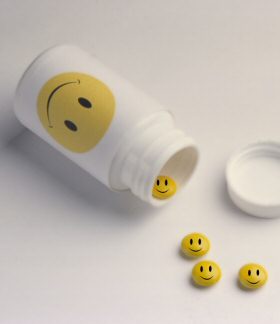7 March 2013
Peptide discovery could lead to happiness pill
by Will Parker
 The neurochemical changes that underlie human emotions are still largely unknown, but UCLA scientists have for the first time identified a specific peptide called hypocretin that is released in large quantities when subjects are happy.
The neurochemical changes that underlie human emotions are still largely unknown, but UCLA scientists have for the first time identified a specific peptide called hypocretin that is released in large quantities when subjects are happy.
The finding, reported in Nature Communications, suggests that boosting hypocretin could elevate both mood and alertness in humans. This, according to the researchers, could lay the foundation for future treatments of psychiatric disorders like depression by targeting measureable abnormalities in brain chemistry.
The study also measured for the first time the release of another peptide (melanin concentrating hormone, or MCH) that greatly increased during sleep, suggesting a key role for this peptide in making humans sleepy.
"The current findings explain the sleepiness of narcolepsy, as well as the depression that frequently accompanies this disorder," said the study's senior author Jerome Siegel. "The findings also suggest that hypocretin deficiency may underlie depression from other causes."
Depression is the leading cause of psychiatric disability in the U.S and more than 6 percent of the population is affected each year, with lifetime prevalence exceeding 15 percent. Yet the use of antidepressants, such as selective serotonin reuptake inhibitors (SSRIs), has not been based on evidence of a deficiency, or excess, of any neurotransmitter. Several studies have questioned whether SSRIs, as well as other depression-fighting drugs, are any more effective than placebos.
In the current study, the researchers obtained their data on both hypocretin and MCH directly from the brains of patients who were being treated for intractable epilepsy. The patients had been implanted with intracranial depth electrodes to identify seizure foci for potential surgical treatment. The location of electrodes was based solely on clinical criteria. The researchers, with the patients' consent, used these same electrodes to "piggyback" their research. A membrane similar to that used for kidney dialysis and a very sensitive radioimmunoassay procedure were used to measure the release of hypocretin and MCH.
The patients were recorded while they engaged in routine daily activities and underwent various clinical manipulations. The subjects rated their moods and attitudes on a questionnaire, which was administered every hour during waking.
The researchers found that hypocretin levels were not linked to arousal in general but were maximized during positive emotions, anger, social interactions and awakening. In contrast, MCH levels were maximal during sleep onset and minimal during social interactions.
Siegel noted that hypocretin antagonists are now being developed by several drug companies for use as sleeping pills and he contends that these drugs will alter mood as well as sleep patterns. "[Our] results suggest a previously unappreciated emotional specificity in the activation of arousal and sleep in humans," Siegel said. "The findings suggest that abnormalities in the pattern of activation of these systems [hypocretin and MCH] may contribute to a number of psychiatric disorders."
Related:
Discuss this article in our forum
Depression caused by brain inflammation?
Hygiene Hypothesis linked to depression
Do antidepressant meds work through personality change?
Antidepressant use primes brain for placebo effect
Source: University of California - Los Angeles
